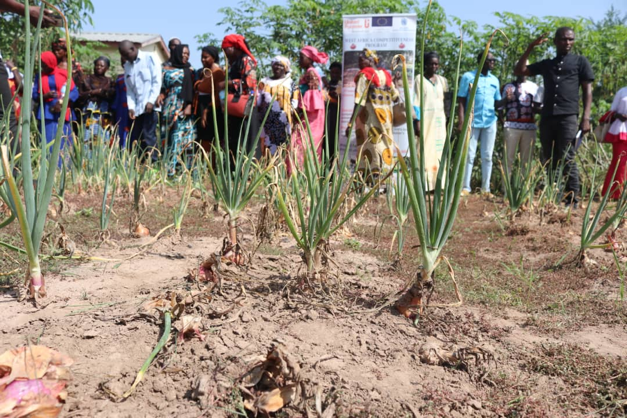
The sites include Jomar community garden in the Lower River Region and Njoben community garden in the Central River Region south.
The tour was basically to enable farmers share best experience as well as to learn from one another regarding best farming practices.
It also aims to help farmers prepare ahead of the next rainy season production; to avail them the opportunity to learn from fellow vegetable growers on best rainy season onion production practice and to showcase some of the success stories at Njoben and Jomar gardens respectively.
UP in partnership with three local NGOs namely; FFHC, NATC and TARUD has received funding from the European Union (EU) to implement the WACOMP, value chain strengthening action in The Gambia.
The move is aimed at increasing competitiveness through enhanced quality and compliance in the onion, tomato, pepper, and orange flesh sweet potato value chain.
The project, which was launched in April 2021, will last for a period of 36 months.
In partnership with local NGOs and the 5 regional Marketing Federations, with a membership of approximately 35,000 of which 95% are women, the project is being implemented in the CRR-N, CRR-S, NBR, LRR and WCR.
Madam Ngansa Touray, UP- WACOMP project manager, explained that the project is geared towards empowering vegetable producers to ensure enough stock in vegetable production, especially onions for both local consumption and export.
However, to compete in the onion market, she indicated that there is a greater need for all year-round onion production in The Gambia.
“UP has imported three varieties of onions in the country to ensure they have wet season onion production and added to the dry season production. This would ensure sufficiency in onion production.”
“The experiments at Njoben and Jomar community gardens have been successful,” the project manager noted. He urged producers to take care of the onion seedlings to avoid importation of seedlings.
Tom Senghore, project officer for UP said initially several were in doubt whether the wet season onion production would be a success but noted the success of the Njoben and Jomar experiments are clear manifestation that the wet season onion production is possible in the country.
“This experiment has shown that we can now cultivate onion year-round,” he said.
Adama M. Jallow, research officer at the Horticulture Unit of the National Research Institute (NARI), advised gardeners to cultivate onion using technique.
He equally challenged them to always keep their products in cool dry place to avoid their produce getting rotten. “Do not allow water to rain on them. If ripe you can uproot the union and store in a house to avoid being spoiled." he said.
Speaking on behalf Njoben onion producers, Mod Gaye said the community has realised that onion can be produced in the wet season.
While commending UP for empowering them with valuable skills, he equally urged onion producers to work hard to ensure sufficient onions in the market.
“The year-round onion production would greatly help to us as producers.” he said.
At Jomar community garden in LRR, Mariama Camara, commended UP and partners for coming up with the new onion variety, further expressing hope the initiative would ensure sufficiency in onion production in the country.
Khaddy Bojang, a resident of Foni Kankuntu, who participated in the study tour, commended WACOMP
project for introducing them to new onion variety meant to increase their production.




